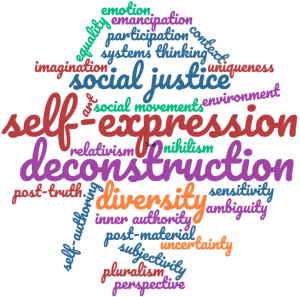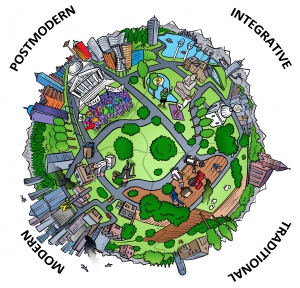
Before you read about your worldview, it’s good to realize this description is based in generalizations of the complexities of reality. These worldviews can best be seen as archetypes or ideal-types: models of recurring patterns or structures.
They cannot tell you what your unique worldview exactly is like. But they can point you in a direction, and outline a way of thinking, a framework of meaning that you may operate from, even though you may not have thought much about it.
These descriptions can therefore help us think about how we view life, nature, our fellow human beings, and ourselves. They can help us explore why we think the way we think. Knowing more about other people’s worldviews may also give us more understanding for people who think differently.


Postmodern worldviews
People with postmodern worldviews are often driven to express their authentic, unique selves. In response to the ‘objectified’, functional, rationalistic modern world, they emphasize the subjective world ~ its emotional, creative, moral, and imaginary dimensions. One of this worldview’s central insights is that human perception shapes the world ~ ie., that we construct our world through the assumptions we hold and the stories we tell. That insight can be very liberating: after all, if our stories create the world, we can also tell other stories, and thus create a different reality. This empowers postmoderns to ‘self-author’ ~ to become the authors of their own story.
The French philosopher Jean-François Lyotard famously summarized the postmodern stance as “disbelief towards meta-narratives”. With this, he pointed to ‘the end of the great stories’ of (particularly) modern society ~ such as the focus on material progress, the undisputed belief in science and technology, and the celebration of capitalism. Because these stories, according to postmodernists, serve the powerful and marginalize minorities, deconstructing those stories is nothing less than an act of social liberation and emancipation. Postmoderns display a new sensitivity and empathy towards those who are excluded and exploited, and are often driven to promote social justice. These are some of their best qualities.
Knowledge
In their quest for truth, postmodernists emphasize multiple modes of knowledge, including qualitative and interpretive science methods, as well as morality, imagination, and art and literature. They challenge the idea that only objective (empirical, quantitative) science can lead to truth. So in this view truth is relative (instead of absolute), contextual (instead of universal) and subjective (instead of objective). That is, there is no generally applicable truth or story, but rather a multiplicity, a kaleidoscope of truths and stories. Rather than relying on external authorities, postmodernists emphasize inner authority ~ such as their ‘moral compass,’ intuition, or feeling.
Reality
The view of reality is therefore diverse and undefined, characterized by uncertainty, ambiguity, and fragmentation. Validating multiple perspectives can lead to an intense relativism, in which the existence of truth itself is disputed: ‘you have your truth, I have mine, so there is no such thing as objective truth.’ Frequently, postmoderns either adhere to a liberal (interpretation of their) religion or spirituality, or display an agnostic attitude, emphasizing that we don’t know whether there is a divine being or reality. Nature is often important in this worldview. As an “inner source”, as a repressed “voice” or entity, and because there is a greater systemic understanding of how everything relates.
Identity and values
Postmoderns often find personal meaning in a sense of self-expression and -development. They cultivate an independent sense of themselves, and yearn to participate and contribute to society in their own, unique ways. “Post-material” values, like creativity, authenticity, imagination, participation, diversity, and pluralism are usually dominant. These post-material values are reflected in the rise of social movements since the 1960’s, which promote, among others, peace, civil rights, feminism, gay rights, and the environment.
Postmoderns often find personal meaning in their self-expression and development. They cultivate an independent identity and desire to participate and contribute to society in their own unique ways. Post-material values ~ such as creativity, authenticity, imagination, participation, diversity, and pluralism ~ are generally dominant. These post-material values are reflected in the rise of social emancipation movements since the 1960s, which promote peace, civil rights, women’s rights, gay rights, and the environment.
Society
Recognizing that we (co-)create the world through the stories we tell can be very empowering. However, it can also undermine notions of truth and reality, resulting in nihilism, relativism, anti-realism, and our current “post-truth” world. The lack of a larger narrative creates profound fragmentation, confusion, and a lack of meaning and direction, fueling today’s “meaning crisis.” While postmodern ‘political correctness’ stems from a passion for social justice, it leads to intolerance towards people who do not share these inclusive values. The postmodern worldview thus presents substantial problems, but also contributes with a (renewed) appreciation of subjectivity and authenticity, sensitivity and empathy, the deconstruction of oppressive narratives, and a commitment to diversity and social justice.

In this image, the postmodern worldview is symbolized by the creative and playful ‘postmodern’ architecture, the colorful – diverse, expressive, authentic – crowd marching for typical postmodern concerns such as peace and justice, and by the courthouse in the back.
Want to learn more about the other worldviews? Read up about traditional worldviews, modern worldviews, and integrative worldviews.
See here an overview of the four worldviews.
Learn more about the research in which the worldview-test was developed, here.
